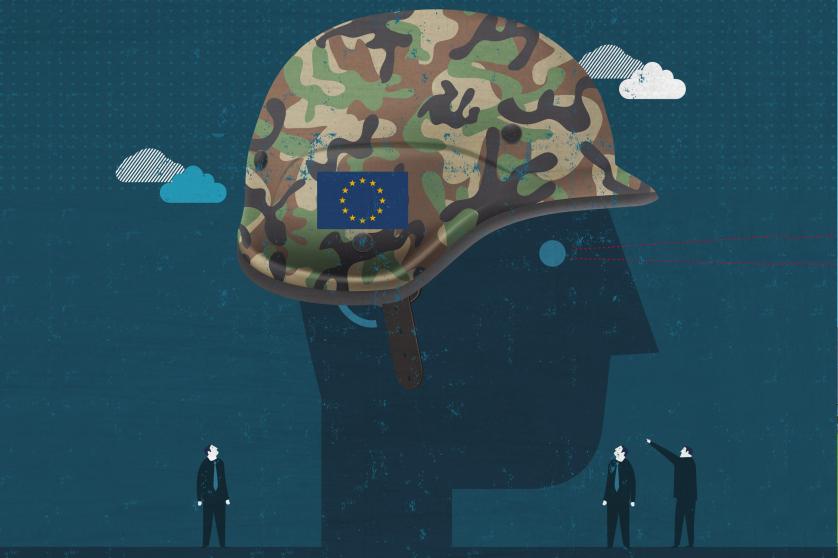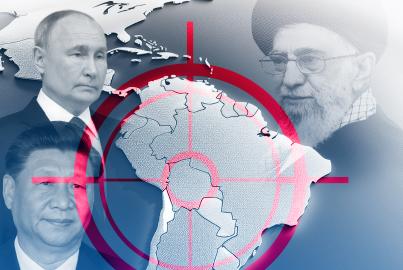Position paper on a European Defence Union

The rules-based international order established by liberal democracies is facing unprecedented challenges. At the same time, the security environment surrounding the EU remains very volatile. From the South to the East, Europe is facing an arch of instability.
In the South, terrorist and criminal organisations are proliferating as instability is spreading largely because of failed or fragile states leading to ungoverned spaces. In the East, Russia’s war against Ukraine continues, as well as the illegal annexation of Crimea. Hybrid tactics, including cyber terrorism and information warfare and energy policy, in particular the proposed Nord Stream 2 pipeline, are not only designed to destabilise Eastern Partnership countries but also Western democracies. Tensions in the Western Balkans are rising.
The migration crisis at the southern and south-eastern borders poses dramatic challenges to the EU and its Member States, including security concerns, and must be addressed in a collective effort. The external and internal security threats are now strongly intertwined.
Brexit and the uncertainties created by the new US administration further complicate the global security landscape. We stand firmly committed to the trans-Atlantic community of common values and interests, which will be the single most important instrument for maintaining European security for the foreseeable future. Increased EU cooperation and coordination in the area of security and defence will not happen at the expense of NATO, but will compliment and strengthen it and considerably raise the efficiency of trans-Atlantic cooperation. Peace and security can no longer be taken for granted.
According to latest data provided by the European Defence Agency for 2015 (estimate), Member States’ armed forces account for 1.4 million soldiers, more than in the United States. Member States’ defence spending amounts to over €200 billion. The effectiveness of this spending is considerably lower than in the United States. The lack of cooperation, coordination and synergies as well as severe duplication and fragmentation contribute to the above. As a result, this is a waste of taxpayers’ money and weakens our efforts in the area of common defence.
We need to apply the entire toolbox of policy instruments ranging from soft to hard power, short-term measures to long-term policies in the area of classic foreign policy encompassing bilateral and multilateral efforts in diplomacy, development cooperation, emergency support, crisis prevention and post-conflict strategies, but also peace-keeping and peace-enforcing. Citizens feel increasingly concerned about security and look to the Union for protection. It is therefore high time for the EU to take more responsibility for its own security.
To-date efforts of EU Institutions
First of all, we have to thank the over five thousand civilian and military personnel for their daily service in CSDP missions and operations spread over three continents. In this context, we reaffirm our commitment to the target of defence spending towards 2% of GDP or more, but also better spending through more common defence projects. The EU already has top-class civilian experts and needs to be able to deploy them quickly. Reacting fast means reacting effectively. A European civil protection force should be established to rapidly react to disasters as well as a common European Cyber Brigade to counter increasing cyber threats to European and Member States’ ICT infrastructure endangering the normal functioning of institutions. These missions are Europe’s common contribution to the security of our citizens. In support of our service members we appreciate the increase in Member States’ defence spending. This trend needs to be sustained, strengthened and coordinated at European level.
The adoption of the EU Global Strategy in June 2016 marked a milestone in strengthening European defence. We are looking forward to its speedy and full implementation by EU institutions and Member States.
We welcome the presentation of the European Defence Action Plan by the European Commission and the 7 June 2017 presentation of the new Defence Package constituting of a means to improve the military capabilities of the Member States. We highlight that in its Reflection Paper on the Future of European Defence, the European Commission and an increasing number of Member States have committed to launching the European Defence Union. This is exactly what the EPP Group has been demanding for a long time.
We expect substantial implementation steps, taking into account the needs of national armed forces. Based on our previous commitments, we fully support the launch of a Pilot Project and a Preparatory Action on EU defence research serving as an incentive for future European collaborative programmes. The intended Coordinated Annual Review on Defence (CARD) could serve this purpose in fostering capability development, addressing shortfalls and ensuring a more optimal use of national defence spending plans.
Recent efforts by Member States and the High Representative of the Union for Foreign Affairs and Security Policy/Vice-President of the European Commission to launch the Permanent Structured Cooperation (PESCO) are leading in the right direction. PESCO is a special means of enhanced, rational and efficient cooperation in the area of security and defence (e.g. establishing a military Schengen) bringing together Member States which could jointly develop capabilities, invest in shared projects, or create multinational formations. It should lead to a higher level of common ambition in defence.
We welcome the recent establishment of the Military Planning and Conduct Capability (MPCC) as the nucleus of a permanent EU headquarters. We appreciate the initiative on Capacity Building in Support of Security and Development (CBSD). It enables the EU to financially support capacity-building and resilience enhancement of partner countries.
The recent EU-NATO Joint Declaration has the potential to move the cooperation to a higher level. We welcome the approval of 42 common EU-NATO initiatives aimed at strengthening both the cooperation and coordination between the two organisations, but also at assuring security for European citizens. We expect that Member States of both organisations will be willing and able to cooperate in areas which are crucial for the security of our citizens.
We recognise that Member States have different positions on security and defence policy for historical reasons and that protocols are set out in various EU Treaties recognising this fact.
In light of the above, the EPP Group demands that:
- this time, EU Institutions and Member States deliver on their commitments to increase the security of our citizens. It is important that Member States strengthen their level of trust and implement the jointly-expressed political will; the EU brings its unique experience in soft power to the security equation, however it needs to continue strengthening its hard power;
- EU Member States take advantage of synergy effects resulting from increased cooperation and coordination in the realm of defence (e.g. defence planning, research and development, procurement, maintenance and consolidation of the armaments industry). This can lead to significant savings freeing-up resources for further long-term investments;
- EU Institutions and Member States need to increase efforts in framing a common Union defence policy (Article 42 (2) TEU). In a space where people, goods, services and money move freely, security cannot be entirely guaranteed by Member States acting alone. Member States should plan together, as one, and then decide which contribution every individual state will make. This should lead to sustaining Europe’s strategic autonomy and to developing a common defence;
- the current EU Global Strategy should lead to an EU White Book on Security and Defence and the definition of a roadmap with realistic and practical steps towards the establishment of a European Defence Union. This Union should encourage a stronger alignment of strategic cultures and a common understanding of threats, which in turn requires developing joint situational awareness capabilities. The White Book needs to link our strategic thinking to the development of military capabilities;
- the EU commits itself to establishing new or enabling existing structures and mechanisms to better support Member States to cooperate more closely on military matters;
- that EU members foster a competitive and innovative defence industrial base. We demand the launch of a European Capability and Armaments Policy as the umbrella for the internal aspects of CSDP efforts; framing on-going efforts to establish supportive measures and synergies in the areas of defence research, capability development procurement and space (e.g. space observation capabilities, drones, cyber defence capabilities, main battle tanks and fighter jets);
- the Member States and the European Commission make the intended Defence Fund a success which leads to the prioritisation of an EU security and defence budget in the next Multiannual Financial Framework (MFF); the European Defence Fund must be sufficiently sourced, for which the envisaged €500 million per year on research and €1 billion on development and acquisitions are an absolute minimum;
- the European Parliament and the Council swiftly pass the draft regulation for a European Defence Industrial Programme in view of an operational CSDP. We need bold implementing measures on how the EU can contribute to financing cooperative projects aimed at better defence;
- the European Commission sets up a Directorate-General for Defence within the remit of the VP/HR in order to coordinate EU internal defence measures, to guarantee an efficient defence market and a functioning European-wide security-of-supply regime; a single market for defence would help critical research and the emergence of start-ups to develop the key technologies Europe needs to meet its security challenges;
- there is a further increase in national defence spending towards 2% of EU GDP by Member States. Moving towards Europe’s strategic autonomy requires spending more on our defence;
- sustaining Europe’s strategic autonomy, as the capacity to act on its own when necessary, requires Member States to spend better and more together on defence, in particular on common procurement projects, standardisation and certification, utilising the existing framework. We should bring Member States’ defence apparatus into line with each other as foreseen by CARD;
- in peacetime, the EU should make use of the legal possibilities to finance defence efforts such as training and education, procurement and maintenance, infrastructure or research, technology and development; EU members should show political commitment, increase investment, share information and create synergies in order to better protect Europeans;
- given the complexity and fragmentation of information systems at European level for border control and security, the EU should encourage ways to improve the interconnection and interoperability of information systems and to avoid duplication and overlapping; in order to better protect its external borders and to combat terrorism, the EU should foster a more effective and efficient data management, while boosting a European security industry;
- The European Commission and co-legislators must work to ensure that EU financial markets are not used by terrorist organisations to fund either their terror activities or their very existence (ECON).
- the EU shall finance civil-military as well as defence research and technology projects facilitating future European collaborative programmes within the European Defence Agency (EDA) or other executive agencies; technological advancement and the surge in users has made cybercrime and terrorist use of the web a new frontier in warfare;
- some European collaborative programmes should be launched envisaging NATO programmes such as the Ballistic Missile Defence for Europe or the Alliance Future Surveillance and Control System so that a direct European industrial involvement in NATO programmes may be assured, thus reinforcing the European role in NATO while strengthening the European strategic autonomy;
- there will be a defence research programme in the next MFF. EU funding as an add-on resource needs to be complimentary towards national research investment. We expect to have future defence research activities in a specific programme within the next MFF;
- Permanent Structured Cooperation has become the cornerstone of the future Defence Union. It should also serve to coordinate isolated islands of military cooperation within Europe but not only be considered as a tool for project coordination;
- concerning the participation in the EU Defence Fund (EDF), the European Defence Action Plan (EDAP) and PESCO Member States clarify how to secure broad participation and a high-level of ambition and commitment at the same time;
- the EU unleashes the full potential of the Treaties in the realm of security and defence (Article 41 TEU - start-up fund; Article 42 TUE - collective self-defence clause; Article 44 TEU - entrusting of CSDP missions to a group of Member States; Article 222 TFEU - solidarity clause);
- that Member States apply full burden-sharing on CSDP operations and missions by enhanced common funding so that Member States will be encouraged to contribute with capabilities and forces, not being restricted by their financial limitations; it is of the utmost importance to review the Athena mechanism for financing the common costs of EU military operations and future deployments of European Union Battle Groups (EUBG). The partnerships and cooperation with countries that share the EU’s values can contribute to the effectiveness and impact of CSDP operations and missions;
- that the EU establishes a fully-fledged Civilian-Military Strategic Headquarters created from the existing Civilian Planning and Conduct Capability (CPCC), Military Planning and Conduct Capability (MPCC), Crisis Management and Planning Directorate (CMPD) within the European External Action Service;
- the EU increases its efforts as a regional security provider and becomes a strong European pillar of NATO. The protection of Europe will become a mutually-reinforcing responsibility of the EU and NATO. We need to strengthen synergies between the EU and NATO avoiding unnecessary overlaps.
- the EEAS East StratCom Task Force to be turned into a permanent EU structure with adequate funding and significantly increased personnel".
The way forward
European defence can no longer be the weakest link in the EU integration process. Europeans need to take their destiny into their own hands and strengthen Europe’s defence, especially since - according to Eurobarometer 85.1 of June 2016 - half of EU citizens surveyed consider EU action insufficient and two thirds of them would like to see greater EU engagement through Member States’ commitment in matters of security and defence policy.
In the current complex security environment, the EU cannot afford to be a bystander. The peace dividend is over. Our values and interests are being challenged and it is time to agree on a higher level of ambition and to put it into practice. The EU is uniquely positioned to take an active role due to its diverse foreign policy instruments, both civilian and military. Yet, to secure peace we need to be ready to act swiftly, decisively and with determination. This will be best done within the future European Defence Union.
Other related content
6 / 54






